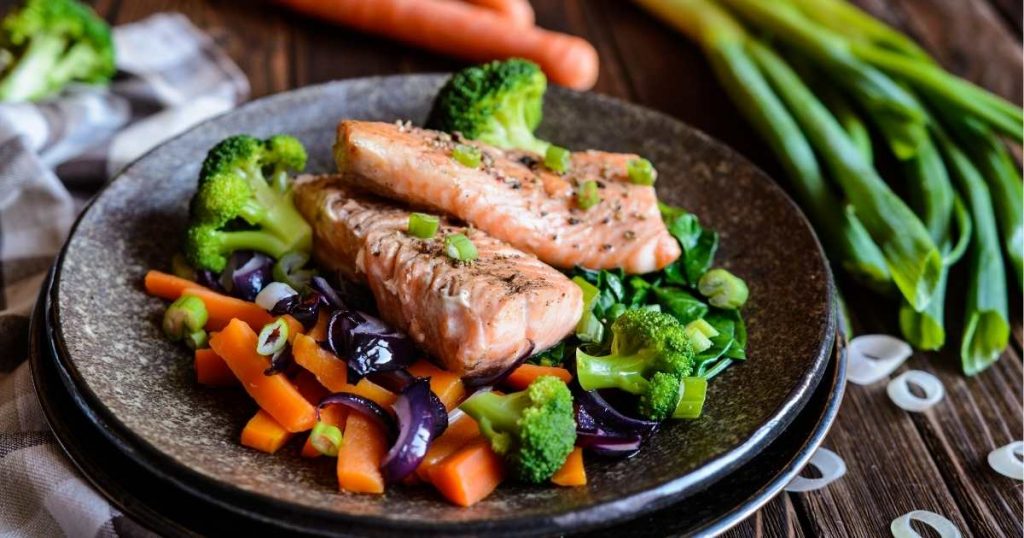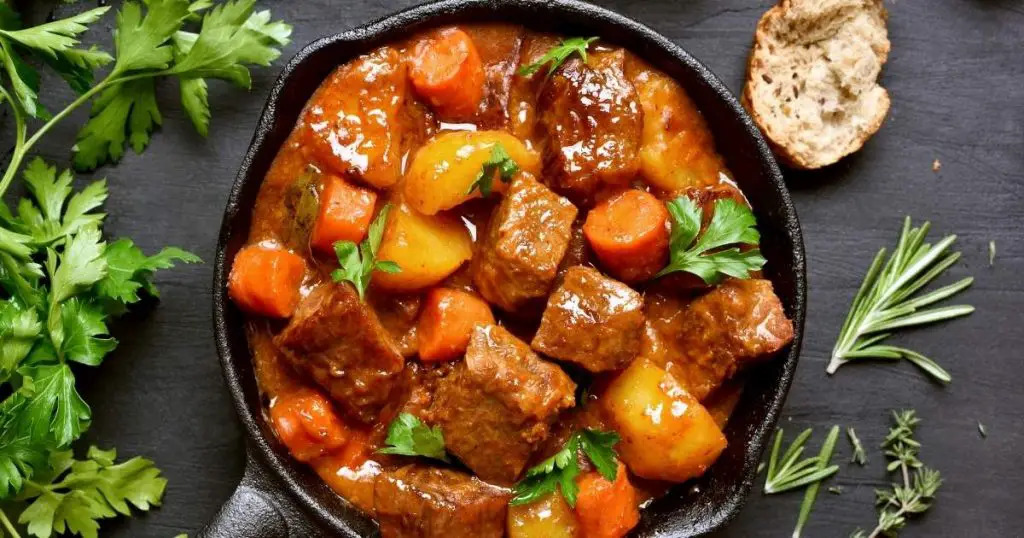As a vegetarian, we have all experienced that moment when we realize there is chicken broth in the soup we just ate or bits of meat in the casserole. We also may just wonder can I binge on one burger without any negative effects. Do vegetarians get sick if they eat meat?
Vegetarians may experience temporary digestive symptoms when reintroducing meat back into their diets. Your “gut flora” and meat disgesting enzymes need time to readjust to the digestion of meat again. Gradually reintroduce meat products starting with broth and then small pieces of fish or poultry moving on to heavier and fattier meats last.
Table of Contents
What Happens When A Vegetarian Eats Meat?
A vegetarian can experiance eating meat in one of two ways.
- They’ve accidentally consumed meat in a meal.
- The person has intentionally reintroduced meat.
Regardless of the way the vegetarian has eaten meat they may experience phycological and physical effects after consuming meat.
In this article, I will share the most common symptoms of consuming meat after being a vegetarian and how to best reintroduce meat if you choose to do so.

The Psychological Reaction Of Eating Meat As A Vegetarian?
Many vegetarians have chosen to abstain from eating meat due to their compassion for animals. If a vegetarian has eaten meat accidentally or intentionally they may start to feel physicological effects.
- A person may feel guilt or shame
- One may feel regretful
Having these feelings may cause a person to feel physical effects. Depending on how upset the person becomes they may feel nausea, lightheadedness, uneasiness, stomach pain, and headache.
The Amount Of Meat You Eat Matters
The amount of meat you eat after being a vegetarian will affect how your body responds.
It’s better to reintroduce meat slowly. Your body will respond much better to consuming small amounts of meat compared to a large steak, hotdogs, and burgers.
If the meat consumption was accidental it’s likely that the amount was small and you should not experience any negative symptoms.

The Quality Of The Meat You Eat Matters
It makes a difference if you are eating a lean piece of chicken or fish compared to a bacon double cheeseburger. The quality of the meat being consumed matters.
If you are going to eat meat again after abstaining for some time it’s best to reintroduce small amounts of lean meats like fish, chicken, turkey, and pork. These meats are much easier to digest and are less likely to cause any negative side effects.
Your Digestive System Does Not Like Change
Everyone’s digestive system has built its own custom bacteria “gut flora”. This “gut flora” is based on the diet that one consumes and adjusts over time to suit that person’s diet.
If a person stops consuming meat products the enzymes needed to properly digest meat may decrease as they are not needed.
The reduction of meat digesting enzymes is not permanent. Your gut is amazing and will adjust to the needs of the foods being consumed. If your diet is drastically changed like eliminating meat or adding a lot of fiber-rich vegetables you may experience symptoms while your gut adjusts to its new needs.
Anytime you eat something different it can upset the balance of your “gut flora” and your gut will need time to adjust.
Drastic changes to your diet will affect your “gut flora” and can cause a temporary upset to your body. It’s best to make gradual dietary changes to lessen any symptoms you may experience.

You May Be Experiencing Food Poisioning
It’s possible that when someone has accidentally or intentionally eaten meat after being a vegetarian that they have gotten food poisoning.
The symptoms of food poisoning can be severe. The most common symptoms are.
- Upset stomach
- Nausea
- Stomach Cramps
- Vomiting
- Diarrhea
- Fever
Food poisioning can last from several hours to days.
Some People Have Food Sensitivity To Meat
A meat sensitivity may cause digestive discomfort for some people like bloating, stomach issues, nausea, and headaches. If you’ve reintroduced meat for some time and you are still experiencing discomfort start keeping a log of your symptoms.
You can be tested for food sensitivities to know if you should be avoiding meat permanently.
Some Vegetarians May Have A Meat Allergy
Less than 1% of the population has a meat allergy. Those that have a meat allergy will have symptoms that are similar to other allergies like runny nose, eyes, congested air passages. These symptoms are much different and can be life-threatening compared to the typical discomfort of a diet change.
It’s unlikely that a person would develop this allergy while being a vegetarian. Most likely a person would’ve always had an allergy to meat.
What Symptoms Have Vegetarians Experienced When They’ve Eaten Meat?
Do vegetarians get sick if they eat meat? The side effects of eating meat after following a vegetarian diet will vary from person to person. Some people may not experience any symptoms while others may experience many.
The most common side effects are.
STOMACH PAIN
Some people have complained of stomach pains after reintroducing meat into their diets.
BLOATING
As your digestive system tries to adjust to the consumption of meat it is common to experience some abdominal bloating.
NAUSEA
The smell or consumption of meat has been known to cause nausea in vegetarians that have abstained from meat for a while.
SKIN PROBLEMS
Some vegetarians have experienced acne outbreaks after reintroducing meat to their diets. On the other hand, many people have experienced their acne problems disappearing and clearing up.
HORMONAL PROBLEMS
Women may experiance an increase in severity of menstrual symptoms.
TIREDNESS
Some people feel tired after eating meat. It may be due to the amount of energy needed to digest meat compared to plant products.
ACHINESS
People have complained of body aches after consuming meat.
GUILT
Most vegetarians are animal lovers and suffered from guilt after consuming meat.

How To Reintroduce Meat After Being A Vegetarian
You want to reintroduce meat back into your diet but, you’ve been a vegetarian for some time. These are my tips on how to best make this transition.
- Re-introduce Meat Slowly
After being a vegetarian for some time the worst thing you can do is to binge eat meat. It’s best to gradually reintroduce meat products one at a time and in small portion sizes. Start with fish, poultry and then add red meat.
2. Have Vegetables Remain The Staring Role
Your body has been used to consuming vegetables. Keep those vegetables in the staring role of your meals. Pasta with vegetables and small chunks of chicken. A baked sweet potato, roasted broccoli with a side of salmon. Your body will adjust better when your diet remains similar to what it has been.
3. Support Your Gut Bacteria
Eat fermented foods and take a probiotic supplement for at least two weeks before reintroducing meat.
4. Start With Bone Broth
If your digestive system has been sensitive to meat in the past start with bone broth before moving on to solid meat.
5. Use Marinades With Acids
Marinate your meat in acids like vinegar and pineapple juice to help tenderize the meat before consumption.
6. Consider Taking Digestive Enzymes
If you experience a heavy feeling after consuming a meal and have a difficult time digesting food talk to your doctor about reintroducing meat and taking digestive enzymes.
7. Purchase High Quality Meats
Look for the highest quality meat you can purchase organic, grass-fed, and grass-finished meats.
8. Consider The Source Of Your Meats
There is a good chance you became a vegetarian due to the unethical treatment of animals. Make sure if you transition back to consuming meat that it is sourced from places and ways that align with your personal ethics.
9. Give Yourself Time
It doesn’t need to be a race. Slowly take your time with the reintroduction of meat and do what feels best for you. Most likely you transitioned slowly to a vegetarian diet. Take the same approach when exploring adding meat back into your diet.

CONCLUSION
Do vegetarians get sick if they eat meat?
After not consuming meat for some time a vegetarian may experience some digestive symptoms when reintroducing meat.
Gradually reintroduce meat products starting with broths then small pieces of fish and poultry. Avoid eating a steak or fattier meats like burgers, sausage, and hot dogs until you are well adjusted to consuming meat again.
Give your gut the time it needs to adjust. The enzymes in your gut are not used to digesting meats. Over time your gut will build up the required enzymes needed to fully digest meat.
You should not experience any severe discomfort. If you do you may be experiencing food poisoning, food sensitivity, or a food allergy. Talk with your doctor about any symptoms you experience.
Whatever your reasons were for becoming vegetarian or adding meat back into your diet, it’s best to listen to your body and fuel it with what it needs to thrive.
Related Posts
Are Eggs Healthy For Vegetarians? The Pros And Cons Of Eating Eggs

